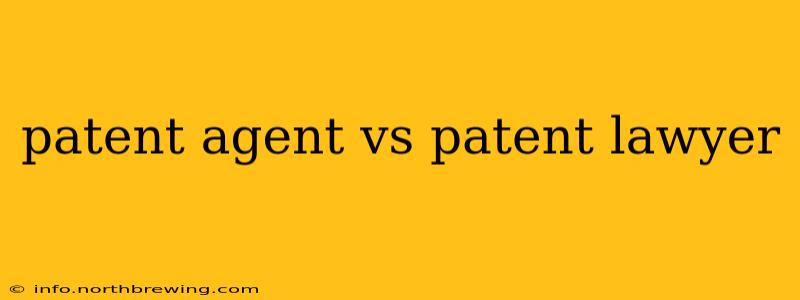Choosing the right legal representative for your patent application is crucial. But with patent agents and patent lawyers both offering similar services, understanding their key differences is vital to making an informed decision. This article clarifies the distinctions between patent agents and patent lawyers, helping you determine which professional best suits your needs.
What is a Patent Agent?
A patent agent is a specialist in patent law who is registered with the United States Patent and Trademark Office (USPTO). They are experts in the technical aspects of patent prosecution, meaning they handle the process of filing and obtaining patents. To become a registered patent agent, an individual must pass a rigorous examination administered by the USPTO, demonstrating a comprehensive understanding of patent law and procedure. They possess significant technical expertise, often stemming from backgrounds in science, engineering, or technology. This technical understanding allows them to effectively communicate the complexities of an invention to the patent examiner.
What is a Patent Lawyer?
A patent lawyer is a licensed attorney who specializes in patent law. They possess both the legal expertise of a lawyer and the technical understanding of a patent agent. This means they can handle all aspects of patent law, including patent prosecution, litigation, and intellectual property portfolio management. Becoming a patent lawyer requires graduating from law school, passing the bar exam, and often completing specialized training in intellectual property law. Their broader legal background allows them to address a wider range of legal issues related to patents beyond simply obtaining them.
What are the Key Differences Between a Patent Agent and a Patent Lawyer?
The primary difference lies in their legal qualifications:
- Legal Authority: Patent lawyers can represent clients in court and handle all aspects of legal proceedings related to patents. Patent agents, on the other hand, are generally limited to representing clients before the USPTO during the patent application process. They cannot represent clients in court.
- Scope of Practice: Patent lawyers can advise on a wider range of legal issues concerning intellectual property, including licensing agreements, trademark disputes, and copyright matters. Patent agents typically focus on patent prosecution and related technical aspects.
- Educational Requirements: Patent lawyers must complete law school and pass the bar exam, whereas patent agents must pass the USPTO registration examination.
- Cost: Generally, patent agents may offer slightly lower fees than patent lawyers, particularly for straightforward patent prosecution. However, the cost depends on various factors, including the complexity of the invention and the experience of the professional.
Can a Patent Agent Handle All My Patent Needs?
For many inventors, a patent agent is perfectly sufficient. If your primary need is to obtain a patent and you don't anticipate any litigation or complex legal issues, a patent agent's expertise in patent prosecution may be all you require. Their deep technical understanding can be invaluable in crafting a strong patent application.
When Should I Hire a Patent Lawyer?
You should strongly consider hiring a patent lawyer if:
- You anticipate potential litigation: If you foresee the possibility of patent infringement or other legal disputes, a patent lawyer's legal experience is crucial.
- You need broader legal advice: If you require advice on licensing agreements, intellectual property portfolio management, or other legal aspects related to your patents, a patent lawyer provides a more comprehensive scope of services.
- Your invention is complex: While patent agents are highly skilled, exceptionally complex inventions may benefit from a patent lawyer's broader legal and technical expertise.
How Do I Choose Between a Patent Agent and a Patent Lawyer?
The best choice depends on your specific circumstances and needs. Consider the complexity of your invention, the potential for litigation, and your overall legal needs. A consultation with either a patent agent or a patent lawyer can help you assess which professional best aligns with your objectives and budget.
What are the pros and cons of each?
Patent Agent:
Pros: Deep technical expertise, often lower fees than patent lawyers, focused on patent prosecution.
Cons: Limited legal authority, cannot represent clients in court, may lack expertise in broader IP issues.
Patent Lawyer:
Pros: Broad legal expertise, can represent clients in court, handle wider range of IP matters.
Cons: Generally higher fees, may not have the same level of specialized technical expertise as a patent agent in complex inventions.
Ultimately, the decision hinges on your individual needs and the complexities of your invention and potential legal challenges. Carefully weigh the pros and cons to make the best choice for protecting your intellectual property.
